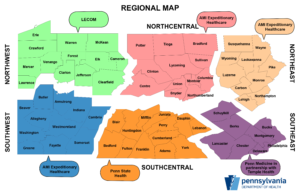PA Health Policy Update for the Week of January 10-14
The following is an update of selected state health policy developments in Pennsylvania for the week of January 10-14, 2022. (Some of the language used below is taken directly from state documents.)
Governor Wolf
 The Wolf administration has announced the creation of the Long-Term Care Resiliency, Infrastructure Supports, and Empowerment program, or LTC RISE, which seeks to give long-term-care facilities “…the support they need to battle COVID-19, recover, and rebuild.” Under the program, long-term-care facilities can pursue improvement projects in the areas of infection prevention and control and emergency preparedness; building a sustainable outbreak response operation; and promoting professional development and a resilient long-term-care facility workforce. The program is funded by a federal grant and replaces the state’s Regional Congregate Care Assistance Teams program, which expired at the end of 2021. Learn more about LTC RISE from this Wolf administration news release and from the LTC RISE web page.
The Wolf administration has announced the creation of the Long-Term Care Resiliency, Infrastructure Supports, and Empowerment program, or LTC RISE, which seeks to give long-term-care facilities “…the support they need to battle COVID-19, recover, and rebuild.” Under the program, long-term-care facilities can pursue improvement projects in the areas of infection prevention and control and emergency preparedness; building a sustainable outbreak response operation; and promoting professional development and a resilient long-term-care facility workforce. The program is funded by a federal grant and replaces the state’s Regional Congregate Care Assistance Teams program, which expired at the end of 2021. Learn more about LTC RISE from this Wolf administration news release and from the LTC RISE web page.
General Assembly
- The House of Representatives unanimously passed House Bill 1280, which amends the Patient Test Result Information Act. This bill eliminates the definition of “significant abnormality” and revises the written notice requirement for health care providers in an effort to provide clarity and eliminate conflicting interpretations of the act. The bill was received in the Senate and referred to the Health and Human Services Committee.
- The House Health Committee convened on Tuesday, January 11 and favorably reported House Bill 1630, which would grant the Pennsylvania Auditor General the authority to audit managed care contracts and subcontracts with pharmacy benefit managers (PBMs) in Medicaid. The committee also reported Senate Bill 709, which would create public awareness of cytomegalovirus (CMV) and provide for CMV screening for certain newborns.
- The House Republican Policy Committee is scheduled to hold a public hearing on rural health care issues next Wednesday, January 19 at 9:30 a.m. The hearing will take place at the University of Pittsburgh at Bradford.
- The state Senate will hold voting session during the week of January 17 on Tuesday (1/18) and Wednesday (1/19).
- The Senate Health and Human Services Committee will convene on Tuesday, January 18 to consider Senate Bill 1019, which addresses COVID-19 regulatory waivers and suspensions.
- The Senate Appropriations Committee is scheduled to convene on Tuesday January 18 to consider, among other bills, Senate Bill 818, which aligns the procedures permitted in ambulatory surgery centers with those permitted by the Centers for Medicare & Medicaid Services (CMS); Senate Bill 861, which enters Pennsylvania into the EMS interstate compact; and Senate Bill 927, which expands eligibility for the Medical Officer Health Incentive Program.
- The Senate Aging and Youth Committee will convene on Tuesday, January 18 at 11:30 a.m. to consider the following bills:
-
- Senate Bill 936, which mandates the reporting and tracking of infants born with an addiction to opioids or other illegal substances within the state.
- House Bill 996, which requires the departments of Health and Human Services to establish protocols to allow a resident of a long-term-care facility to receive visits by a member of the clergy during a disaster emergency.
- House Bill 1737, which enables a county children and youth agency to petition the court for an order to compel a drug screening when there is evidence that substance use may be a contributing cause of child abuse or neglect.
 Department of Human Services
Department of Human Services
- Various Department of Human Services (DHS) regulations were suspended to facilitate the state’s response to the COVID-19 pandemic. Some of those suspensions have been lifted, so some of the temporarily suspended regulations are being enforced again. For an updated list of regulations and their current status, organized by offices within DHS and with the most recent changes highlighted, go here.
- DHS has announced the addition of procedure codes to the Medical Assistance fee schedule for the administration of booster doses of COVID-19 vaccines. To find those new codes and the rates to be paid, see this Pennsylvania Bulletin notice.
- DHS has announced the addition of procedure codes to the Medical Assistance fee schedule for the administration of the Pfizer pediatric COVID-19 vaccine. Find the procedure codes, rates, and more in this Pennsylvania Bulletin notice.
- DHS has issued a Medical Assistance Bulletin informing providers of changes in billing procedures for certified registered nurse practitioners and physician assistants serving fee-for-service patients.
- DHS has issued a Medical Assistance Bulletin informing providers and pharmacies that the fee-for-service program will require prior authorization for prescribing Aduhelm (aducanumab), the new drug to treat Alzheimer’s disease.
- DHS has issued a Medical Assistance Bulletin informing providers and pharmacies that it has issued updated handbook pages presenting the requirements for prior authorization and the type of information needed to evaluate the medical necessity of prescriptions for Xyrem (sodium oxybate)/Xywav (calcium, magnesium, potassium, and sodium oxybates) for fee-for-service patients. Find the notice here.
- DHS announced that it intends to continue making Medical Assistance Day One Incentive payments to qualified non-public nursing facilities in FY 2022. These payments seek to give incentives to non-public nursing facilities to serve individuals who are Medical Assistance-eligible on the day of admission. Learn more about how and when the payments will be made and how they will be calculated in this Pennsylvania Bulletin notice.
- DHS is making available for public review and comment its proposed renewal application for extension of the Section 1115 Medicaid demonstration titled “Medicaid Coverage for Former Foster Care Youth from a Different State and SUD Demonstration.” The effective dates of the current approved demonstration are October 1, 2017 through September 30, 2022. The extension requested will be for an additional five years, through September 30, 2027. Learn more about the program and the state’s planned request from this Pennsylvania Bulletin notice.
- DHS’s Office of Child Development and Early Learning has updated its FAQ on its guidance for tuberculin skin testing and COVID-19 vaccinations for providers participating in its licensed programs. Find that FAQ here.
 Department of Health
Department of Health
In the past week the Department of Health announced the opening of a new COVID-19 testing site in Cambria County to go along with other recently opened testing sites in Berks, Blair, Centre, Clinton, Delaware, Luzerne and Mifflin counties. In addition, the state has announced that a new high-volume and high-throughput COVID-19 testing site will be opening soon in Delaware County at Mercy Fitzgerald Hospital. This site will be staffed by U.S. Department of Health and Human Services contractors with additional support from the host location, the costs for which will be eligible for reimbursement by FEMA. The Department of Health continues to talk to federal officials about the possibility of opening an additional high-volume testing site in the south-central part of the state.
The Department of Health has announced that Credentia will serve as its new contractor to operate the Pennsylvania nurse aide registry previously operated by Pearson Vue. Go here for the nurse aide registry search. The Pearson Vue link no longer works as of January 3.
COVID-19: By the Numbers
- Daily COVID-19 case counts are higher than they have been at any time since the pandemic began. The state’s total of 33,650 new cases last Saturday, January 8 was the highest single-day total since the pandemic began.
- The number of new COVID-19-related deaths remains very high.
- To date, Pennsylvania has had nearly two million confirmed cases of COVID-19, more than 400,000 cases that have been classified as “probably” COVID-19, and more than 38,000 deaths attributed to the disease.
- All 67 Pennsylvania counties continue to experience a high rate of COVID-19 transmission.
- Since January 1, the number of Pennsylvanians hospitalized because of COVID-19 has risen 42 percent; the number in hospital ICUs because of COVID-19 has risen 20 percent; and the number on ventilators because of the virus has risen 20 percent.
- This situation is reflected in the high rate of occupancy in the state’s hospitals. In Pennsylvania today there currently are only 475 unoccupied adult ICU beds – 13.3 percent of the total of such beds in the state; 2097 unoccupied medical/surgical beds – 10.3 percent of such beds; 35 unoccupied pediatric ICU beds (9.5 percent); 276 unoccupied pediatric beds (25.5 percent); and 914 unoccupied airborne isolation beds (28.5 percent).
- On January 11 the Department of Health elaborated on some of these figures, reporting that approximately 31 percent of all staffed adult ICU beds are occupied by COVID-19 patients, up from 28 percent last week, and that 33 percent of all ventilators state-wide are currently in use, up from 32 percent last week.
- Media reports confirm the challenges some communities and hospitals are facing, including Delaware County, where every hospital bed is filled and one hospital is closing its ER; a report than an especially high proportion of hospital patients in Lehigh County need intensive care; a report that some Philadelphia-area hospitals are overwhelmed with patients while hospitals in the Erie area are seeing record numbers of COVID-19 patients, hospitals in the Lancaster area are seeing record numbers of COVID-19 patients, and a mid-state health system has instituted new policies to limit how many people may visit its hospitals’ patients.
 Stakeholder Events
Stakeholder Events
Pennsylvania Rural Health Redesign Center Authority Board – January 18
The Pennsylvania Rural Health Redesign Center Authority Board will hold its next virtual meeting on Tuesday, January 18 at 10:00 a.m. The meeting will provide updates on a variety of topics, including model status updates, federal grant deliverables, global budget methodology, and more. It also will address current and upcoming activities. For information about how to join the meeting, see this Pennsylvania Bulletin notice.
Infant Hearing Screening Advisory Committee – January 20
The Infant Hearing Screening Advisory Committee will hold a public meeting both in person and virtually on Thursday, January 20 at 1:00 p.m. Agenda items will include reports by the cytomegalovirus and audiology subcommittees, an assessment of audiology training currently in development, and a review of upcoming program activities. For information about how to join the meeting, either virtually or in person, see this Pennsylvania Bulletin notice.
Medical Assistance Advisory Committee’s Consumer Subcommittee – January 26
The consumer subcommittee of the Medical Assistance Advisory Committee will meet virtually on Wednesday, January 26 at 1:00 p.m. Go here to register to participate.
Medical Assistance Advisory Committee – January 27
The Medical Assistance Advisory Committee will meet virtually on Thursday, January 27 at 10:00 a.m. Go here to register to participate.
Medical Marijuana Advisory Board – January 27
The Medical Marijuana Advisory Board will hold a virtual meeting on Thursday, January 27 at 10:00 a.m. This meeting will be broadcast live through Commonwealth Media Services. Check www.medicalmarijuana.pa.gov and click on the Medical Marijuana Advisory Board tab for live streaming information on the day of the virtual meeting. Learn more from this Pennsylvania Bulletin notice.
Patient Safety Authority – January 27
The Patient Safety Authority will hold a virtual public meeting on Thursday, January 27 at 1:00 p.m. For information about how to join the meeting, see this Pennsylvania Bulletin notice.
Special Pharmaceutical Benefits Program Advisory Council – January 27
The Statewide Special Pharmaceutical Benefits Program Advisory Council will hold a public teleconference meeting on Thursday, January 27 at 10 a.m. To participate, call 412-648-8888 or 866-588-4789. The meeting ID is 487 872 318#. Learn more from this Pennsylvania Bulletin notice.
Medical Assistance Advisory Committee – Managed Long-Term Services and Supports Subcommittee – February 2
The DHS Medical Assistance Advisory Committee’s managed long-term services and supports subcommittee will meet virtually on Wednesday, February 2 at 10:00 a.m. Interested parties can join the meeting here or call in at 914-614-3221, access code 300-175-489.
Office of Long-Term Living – Financial Management Services Stakeholder Meeting – February 4
The DHS Office of Long-Term Living’s financial management services stakeholder group will hold a virtual public meeting on Friday, February 4 at 1:00 p.m. to discuss upcoming changes for the administration of financial management services under the Community HealthChoices, OBRA Waiver, and Act 150 programs. Go here to participate or join by phone at 1-408-418-9388.
 State Revenue Update
State Revenue Update  Department of Drug and Alcohol Programs
Department of Drug and Alcohol Programs Around the State
Around the State General Assembly
General Assembly Department of Human Services
Department of Human Services Pennsylvania Health Care Cost Containment Council (PHC4)
Pennsylvania Health Care Cost Containment Council (PHC4) Beginning today, SNAP is expanding its regular COVID-19 updates to encompass a broader scope of Pennsylvania state health policy endeavors. As efforts to address COVID-19 prove more effective and the state moves from focusing almost exclusively on the public health emergency back to its usual, much broader array of health policy concerns, we hope this update will be a useful resource on matters of importance to the hospital community. Please feel free to share this newsletter with others in your organization or to send us the email addresses of those you think might be interested and we will send it directly to them.
Beginning today, SNAP is expanding its regular COVID-19 updates to encompass a broader scope of Pennsylvania state health policy endeavors. As efforts to address COVID-19 prove more effective and the state moves from focusing almost exclusively on the public health emergency back to its usual, much broader array of health policy concerns, we hope this update will be a useful resource on matters of importance to the hospital community. Please feel free to share this newsletter with others in your organization or to send us the email addresses of those you think might be interested and we will send it directly to them. In the Legislature
In the Legislature COVID-19: By the Numbers
COVID-19: By the Numbers


